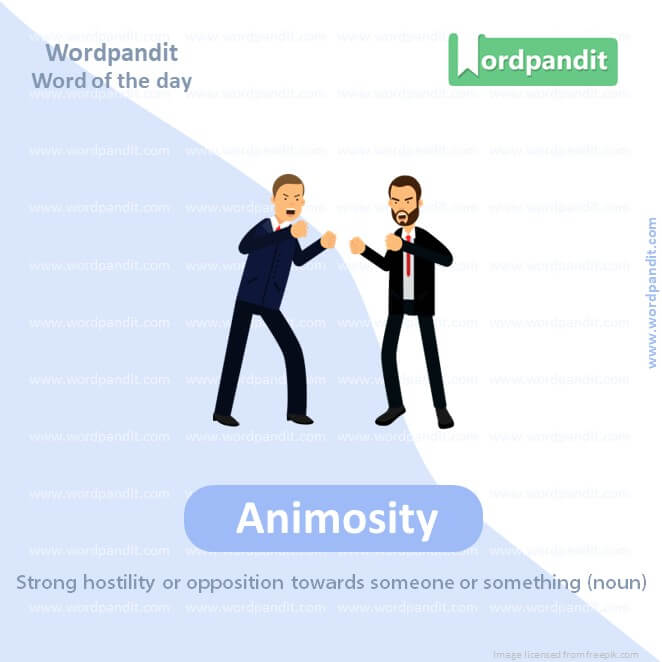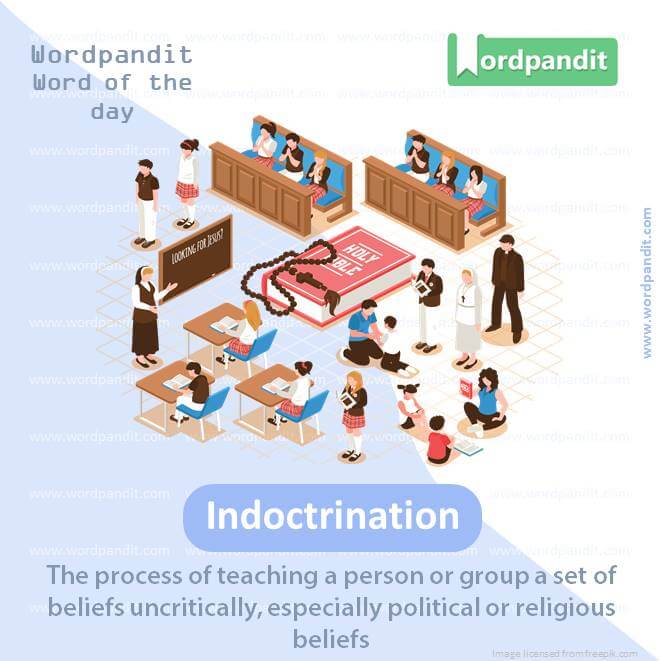Daily Vocabulary Words: List of Daily Used Words
Hi there. Welcome to this special section @ Wordpandit.
Our endeavour here is straightforward: highlighting important daily vocabulary words, you would encounter in The Hindu. This is your repository of commonly used words; essentially, we are posting a list of daily used words. Hence, this has significant practical application as it teaches you words that are commonly used in a leading publication such as The Hindu.
Visit the website daily to learn words from The Hindu.
WORD-1: Exacerbates
CONTEXT: A critical shortage of doctors exacerbates these issues, with WHO data indicating only 0.8 doctors per 1,000 people, which is below the advised ratio.
SOURCE: The Hindu
EXPLANATORY PARAGRAPH: Imagine if you have a small cut on your hand and instead of putting a band-aid on it, you rub dirt into it. The cut gets worse, right? That’s like exacerbating. It’s when something is already not so good, and then you do something that makes it even worse.
MEANING: To make a bad situation or problem worse (verb).
PRONUNCIATION: ig-ZAS-er-bates
SYNONYMS: Worsen, aggravate, intensify, amplify, heighten
USAGE EXAMPLES:
1. Yelling in an argument only exacerbates the conflict.
2. Ignoring health advice can exacerbate an illness.
3. Pollution exacerbates climate change.
4. Lack of sleep often exacerbates stress.

WORD-2: Efficacy
CONTEXT: The commercial sector and charitable organisations advance accessibility and affordability while extending reach and efficacy.
SOURCE: The Hindu
EXPLANATORY PARAGRAPH: Think about when you’re trying to blow up a balloon. If you blow hard enough and the balloon gets big, it means you’re doing it effectively. Efficacy is just a fancy word for saying how well something works or does its job.
MEANING: The ability to produce a desired or intended result
PRONUNCIATION: ef-FI-ca-see
SYNONYMS: Effectiveness, potency, efficiency, usefulness, productivity
USAGE EXAMPLES:
1. The efficacy of the new medicine was confirmed by the doctors.
2. Washing hands with soap has high efficacy in preventing illness.
3. Studies show the efficacy of regular exercise in improving health.
4. The efficacy of solar panels can decrease without proper maintenance.
WORD-3: Deliberately
CONTEXT: The existence of Phoenix Settlement, no one has ever accused us of deliberately leaving out a sect or engaging in “mass indoctrination”, as is alleged by the posting,” she said.
SOURCE: The Hindu
EXPLANATORY PARAGRAPH: When you take your time to color inside the lines, making sure every part is perfect, you’re doing it on purpose. Deliberately means doing something on purpose, not by accident.
MEANING: Intentionally, or done in a careful and unhurried way (adverb).
PRONUNCIATION: deh-LIB-er-it-lee
SYNONYMS: Intentionally, purposely, consciously, knowingly, thoughtfully
USAGE EXAMPLES:
1. She deliberately chose the quietest room for the meeting.
2. The decision was made deliberately after much thought.
3. He deliberately ignored the warning signs.
4. The artist deliberately used bright colors in her painting.

WORD-4: Citing
CONTEXT: I personally invited many Hindus individually and a number of Hindu faith leaders collectively, to recite a Hindu prayer at this function,” said Ela, citing invitations to four Hindu organisations which she said could not attend because of other commitments.
SOURCE: The Hindu
EXPLANATORY PARAGRAPH: Imagine if you found a really cool fact in a book and told your friend about it, making sure to say which book it was from. That’s like citing. It means telling people where you got your information or ideas from.
MEANING: Mentioning something as proof or as an example, or to support an
idea or argument (Verb)
PRONUNCIATION: SYE-ting
SYNONYMS: Quoting, referencing, mentioning, alluding to, acknowledging
USAGE EXAMPLES:
1. In her essay, she was citing examples from a well-known author.
2. The student was praised for citing all his sources correctly.
3. Citing a famous scientist, he made his argument stronger.
4. Laws are often made by citing the need for public safety.

WORD-5: Animosity
CONTEXT: All our faiths and our scriptures are there to guide us to be good, compassionate and loving people. Hatred, animosity and violence are not part of our essential religious teachings.
SOURCE: The Hindu
EXPLANATORY PARAGRAPH: Think about how you feel when someone takes your favorite toy without asking. You might feel really mad or upset with them. That feeling is called animosity. It’s when you’re feeling really unfriendly or angry towards someone.
MEANING: Strong hostility or opposition towards someone or something (noun).
PRONUNCIATION: an-uh-MOS-i-tee
SYNONYMS: Hostility, hatred, ill will, antagonism, enmity
USAGE EXAMPLES:
1. There was a clear animosity between the two rival teams.
2. He felt no animosity towards his competitor, despite the rumors.
3. Animosity grew over time due to the unresolved dispute.
4. To reduce animosity, the leader called for peace talks.

WORD-6: Indoctrination
CONTEXT: The existence of Phoenix Settlement, no one has ever accused us of deliberately leaving out a sect or engaging in “mass indoctrination”, as is alleged by the posting,” she said.
SOURCE: The Hindu
EXPLANATORY PARAGRAPH: Imagine if someone tried to teach you that only their favorite color is the best and all other colors are bad, and you should think the same way too. That’s indoctrination. It’s when someone tries to make you believe exactly what they believe, not allowing you to think differently.
MEANING: The process of teaching a person or group a set of beliefs uncritically, especially political or religious beliefs
PRONUNCIATION: in-DOCK-tri-nay-shun
SYNONYMS: Brainwashing, persuasion, conditioning, influence, teaching
USAGE EXAMPLES:
1. The cult’s indoctrination methods were controversial.
2. Schools should educate, not engage in indoctrination.
3. Through indoctrination, he adopted the group’s radical beliefs.
4. The documentary exposed the indoctrination practices of the regime.
WORD-7: Mischievous
CONTEXT: Those who promote the acts in the name of religion are misinterpreting their faiths for mischievous reasons and should be shunned,” Ela said.
SOURCE: The Hindu
EXPLANATORY PARAGRAPH: Imagine someone who likes to play harmless tricks, like tying two shoelaces together or making funny faces. That person is being mischievous. It means they like to have fun by causing a little bit of trouble, but they don’t want to hurt anyone.
MEANING: Behaving in a way that is slightly bad but is not intended to cause serious harm or damage (adjective).
PRONUNCIATION: MIS-chuh-vus
SYNONYMS: Naughty, playful, impish, prankish, roguish
USAGE EXAMPLES:
1. The mischievous cat knocked over the vase while playing.
2. His mischievous smile hinted he was up to something.
3. They planned a mischievous prank for April Fools’ Day.
4. The children’s mischievous antics were amusing to the adults.
WORD-8: Compassionate
CONTEXT: All our faiths and our scriptures are there to guide us to be good, compassionate and loving people.
SOURCE: The Hindu
EXPLANATORY PARAGRAPH: Imagine seeing someone fall down and feeling like you want to help them up and make sure they’re okay. That feeling is called being compassionate. It means you care about others and want to help them when they’re in trouble or feeling sad.
MEANING: Feeling or showing sympathy and concern for others (adjective).
PRONUNCIATION: kuhm-PASH-uh-nit
SYNONYMS: Caring, kind, sympathetic, empathetic, tender-hearted
USAGE EXAMPLES:
1. The teacher was compassionate towards students who struggled.
2. Compassionate people are often volunteers in community services.
3. His compassionate gesture made her feel supported.
4. The law was changed by a compassionate plea from the community.

WORD-9: Coalition
CONTEXT: The PTI has not nominated its candidate for the post of chairman Senate to challenge the joint candidate of the ruling coalition amid its opposition to the polls for the top slot.
SOURCE: The Hindu
EXPLANATORY PARAGRAPH: Imagine if you and your friends join together to build a huge castle out of blocks. Each of you brings some blocks to make it bigger and better. A coalition is just like that. It’s when groups or people come together to achieve something they all think is important.
MEANING: A tem porary alliance for combined action, especially among political parties (noun).
PRONUNCIATION: koh-uh-LISH-un
SYNONYMS: Alliance, union, partnership, league, consortium
USAGE EXAMPLES:
1. The political parties formed a coalition to pass the new law.
2. Environmental groups formed a coalition to protect the forests.
3. A coalition government was established after the elections.
4. The coalition worked together to provide disaster relief.
WORD-10: Extinguishing
CONTEXT: The Lubbock, Texas, fire department confirmed online a fire in one of the two engines that needed extinguishing.
SOURCE: The Hindu
EXPLANATORY PARAGRAPH: Think about when you blow out the candles on your birthday cake. You’re making the fire go away so that only smoke is left. Extinguishing is just a fancy word for putting out something that’s burning, like a candle or a fire, so it stops burning.
MEANING: To cause a fire or light to stop burning or shining, to put out (verb).
PRONUNCIATION: ik-STING-gwish-ing
SYNONYMS: Quench, snuff out, douse, smother, suppress
USAGE EXAMPLES:
1. The firefighters worked hard to extinguish the wildfire.
2. He extinguished the candle before leaving the room.
3. Rain helped to extinguish the fire in the forest.
4. Safety protocols are important for extinguishing industrial fires.
Vocabulary Words with Meaning
Penetrating the rich tapestry of language, the essence of ‘vocabulary words with meaning’ is a crucial aspect. It’s these seeds of knowledge that bud into fluent conversations and comprehensive understanding. The knack of grasping ‘vocabulary words with meaning’ is pivotal in language learning, but it demands a nuanced approach and strategy.
Learning ‘vocabulary words with meaning’ isn’t about mechanically memorizing heaps of words. It’s about building connections and creating a profound understanding of these words. A promising approach to assimilate ‘vocabulary words with meaning’ involves utilizing a wide range of resources including literature, films, music, and digital content. This immersion provides a broad context and diverse settings for these words, simplifying their comprehension and use.
When you’re focusing on ‘vocabulary words with meaning’, remember to incorporate memory-enhancing techniques into your learning regimen. Tools like flashcards or recall-based applications can aid significantly in long-term retention of these words. Additionally, mnemonic strategies, associating words with distinctive images or stories enhance memory recall and understanding.
The journey of mastering ‘vocabulary words with meaning’ also benefits greatly from practice and application. Engage in conversations using the language, express your thoughts in writing, and try to incorporate newly learned words into your routine. This not only enhances your familiarity with the words but also aids in an intimate understanding of their connotations and denotations.
To sum up, learning ‘vocabulary words with meaning’ is akin to assembling a jigsaw puzzle: it requires patience, strategy, and persistence. But the picture that finally emerges is a beautiful tapestry of language – vivid, articulate, and expressive. So, set your sails toward the voyage of ‘vocabulary words with meaning’, and discover the joy of speaking and understanding a language with finesse.










